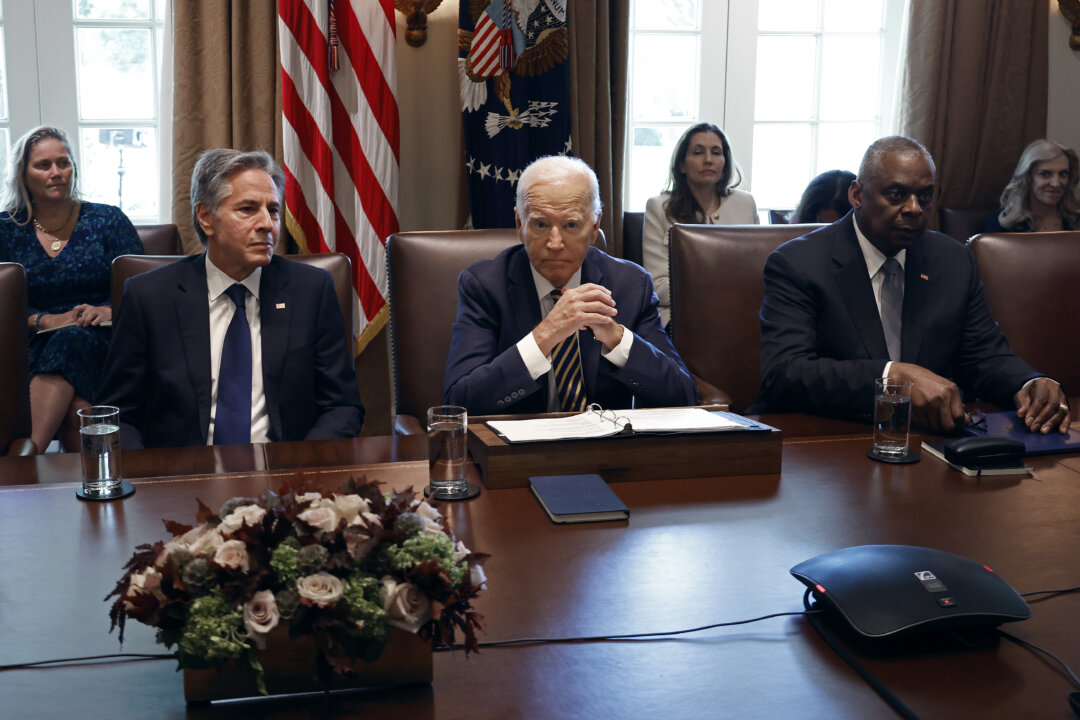The Biden administration has previously warned that U.S. policy toward Israel may be impacted by humanitarian conditions in the Gaza Strip.
President Joe Biden’s administration has sent a new warning message for Israel to improve humanitarian conditions in the Gaza Strip as Israeli forces continue to operate there.
Secretary of Defense Lloyd Austin and Secretary of State Antony Blinken delivered the warning in an Oct. 13 letter to Israeli Defense Minister Yoav Gallant and Strategic Affairs Minister Ron Dermer.
The communication to the Israeli ministers was meant to be kept private, but its contents were leaked to the press.
“This was a letter we consider to be a private diplomatic communication that we did not intend to make public from our side, but now that it is public, I’m happy to confirm it and speak to it to some extent,” State Department spokesman Matthew Miller said at an Oct. 15 press briefing.
Miller said the letter communicated a concern that Israel has not sustained support for humanitarian assistance entering the Gaza Strip and that such aid has fallen to about 50 percent of its wartime peak.
“So [Blinken], along with Secretary Austin, thought it was appropriate to make clear to the government of Israel that there are changes that they need to make again to see that the level of assistance making it into Gaza comes back up from the very, very low levels that it is at today,” Miller said.
The Biden administration warned Israel about its handling of humanitarian issues in Gaza in April. Speaking on Oct. 15, Miller said this previous outreach yielded some temporary improvements, but “what we have seen over the past few months is that the level of humanitarian assistance has not been sustained.”
Photographs of the letter, posted on social media platform X, formerly known as Twitter, on Oct. 15 by an Axios reporter, revealed Austin and Blinken warning Israeli officials to improve humanitarian conditions in Gaza within 30 days. Should Israel fail to do so, the U.S. officials said, there may be “implications for U.S. policy under NSM-20 and relevant U.S. law.”
NSM-20 refers to a presidential policy memorandum Biden implemented in February. It reiterates a requirement that countries receiving U.S. arms transfers commit to not arbitrarily deny or otherwise impede U.S. humanitarian assistance efforts. A U.S. federal law, known as the “Leahy law,” also specifies that the U.S. government may not provide military assistance to foreign military units suspected of violating human rights.
Miller declined to specify what consequences may be on the table if Israel doesn’t adequately address the humanitarian concerns Austin and Blinken raised in the letter.
“There are implications under U.S. law, under policy, that I’m not going to speak to here, largely because we hope that Israel makes the changes that [Austin and Blinken] outlined in the letter,” Miller said.
Pentagon spokeswoman Sabrina Singh and National Security Council spokesman John Kirby also declined to specify the possible consequences.
The Epoch Times reached out to the Israeli Ministry of Defense and the Israeli Ministry of Strategic Affairs regarding the letter from Austin and Blinken. Neither Israeli ministry responded by press time.
According to the letter, Israel must enable a minimum of 350 truckloads of humanitarian supplies to reach Gaza daily. It also called on Israeli authorities to coordinate with humanitarian organizations and implement pauses in the fighting in the Gaza Strip to allow humanitarian deliveries to proceed safely.
Blinken and Austin called on Israeli forces to allow internally displaced refugees to move further inland during the winter season. Al-Mawasi, one of the main humanitarian corridors for refugees, is situated along the Mediterranean coastline.

The Oct. 13 letter also calls for Israeli forces to cease isolating parts of northern Gaza.
The letter was sent amid reports that Israeli military leaders are considering a new strategy in Gaza to defeat Hamas, an internationally designated terrorist organization. The plan, drafted by retired Israeli generals and dubbed the “Generals’ Plan,” calls for Israeli forces to give civilians a deadline to leave designated areas of northern Gaza. Those who remain in those cordoned areas would then be deemed lawful combatants and would risk being targeted by Israeli strikes or cut off from food, water, and other essential supplies.
Miller addressed this “Generals’ Plan” during an Oct. 9 department press briefing.
Asked if the United States would support such a plan, he replied, “That would be absolutely unacceptable.”
U.N. officials said last week that aid entering Gaza is at its lowest level in months. About 80 trucks carrying aid have entered through crossings in Gaza’s north since Oct. 1, down from roughly 60 trucks a day previously, according to the U.N. website tracking deliveries.
The Coordination of Government Activities in the Territories, or COGAT, the Israeli body facilitating aid crossings into Gaza, denied that crossings to the north had been closed.
Israel and Hamas have been at war since the terrorist group attacked Israel on Oct. 7, 2023, leaving roughly 1,200 dead, about two-thirds of whom were civilians. Hamas injured thousands more during the attacks and kidnapped another 250 people, about 100 of whom remain in captivity in Gaza.
The Gazan Health Ministry claims that Israel has killed more than 42,000 people in Gaza during the war. The agency does not differentiate between combatants and noncombatants but has said that a little more than half the dead are women and children.
The Associated Press contributed to this article.

